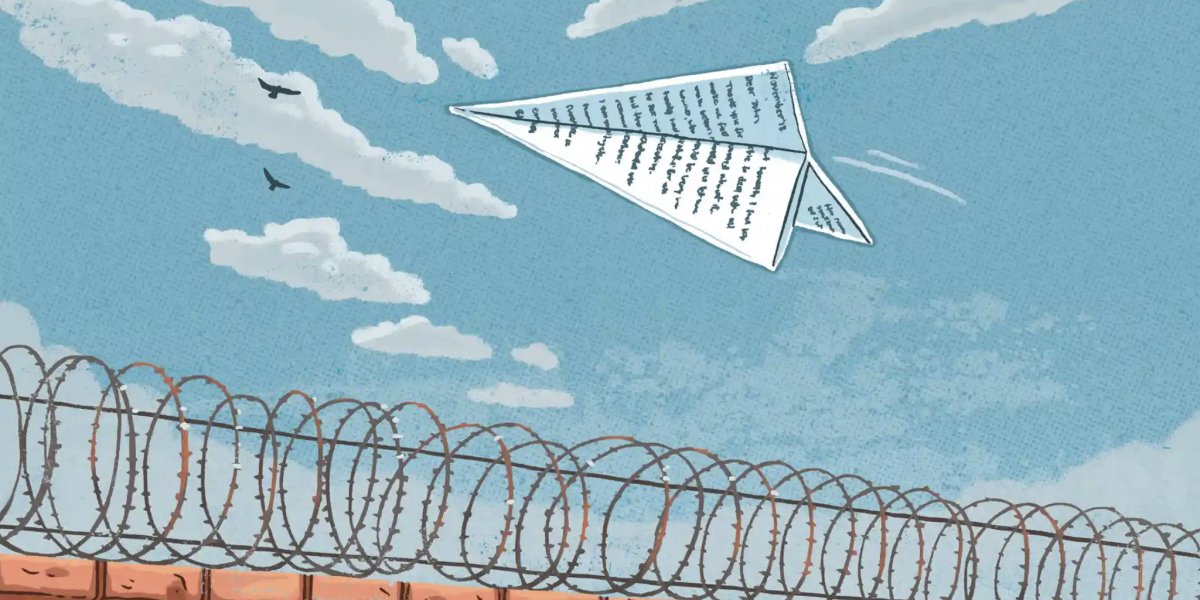Write On! Supporting Prisoners through Correspondence, is a group of students, workers and residents of Canada (primarily in Ontario) who, since 2019, offer support to people incarcerated in Canada. We answer prisoners’ letters and respond to their requests for different kinds of information. As of March 2022, we have responded to around 450 letters. Many who write to us emphasize how important our services are to them, as they have few avenues to find the information that they are requesting. While incarcerated, they cannot use the internet, and access to written materials such as books, magazines, documents, etc. is severely limited.
Access to information
The information that incarcerated folks ask us to send them is extremely varied. Commonly requested topics include: health and wellness, psychology, geography, books, music, legal research, human rights, pen pal services, programs and services in the community, educational courses, and careers. As one writer put it, “you are our ‘google”. We have unknowingly found ourselves in the daunting role of being the bridge between people on the inside, and information and resources in the outside world.
From the letters received, we sense people’s isolation and loneliness. Keeping in touch with friends and family on the outside has many challenges. Those inside have no access to email, or other means of communicating through the internet, and no access to cell phones. Phone calls (from landline phones) are limited to 20 minutes and are extremely costly. There are many rules and restrictions around in-person visits, and many prisons are situated in out-of-the-way and secluded areas, making it difficult for people’s loved ones to visit. This has only worsened during the COVID-19 pandemic with increased visitation restrictions.
Something we have noticed is that incarcerated folks who write us often ask for information that could better their lives: legal information to help them work on their court cases, books and reading materials to expand their minds, health and wellness information that can improve their mental and physical wellbeing, services and resources that can help them, and educational programs and career paths they wish to pursue so that they can become self-sufficient. We have also had people write to us requesting information on the rights of people in prison, access to legal help regarding abuse and harm experienced in prison and/or by the criminal justice system.
We are surprised and troubled that this information is not available to them inside. We wonder why people in prison lack access to the internet or other information sources? This is especially concerning when much of what they are asking would be very helpful to them in terms of their learning, growth, ability to work on personal and professional goals, plans for life on the outside, and to ensure their own safety and rights are being upheld.
Another consistent message we get from the letters is that many are bored, and have little to do to occupy their time. They beg us for reading material, puzzles, games, exercises, pictures to colour, even jokes, to while away the hours. Would it not make more sense if they had constructive things to do with their time? And this could include what they are asking for: access to books, courses, learning opportunities, including access to the internet.
Prison does not make us safer
It has made us question: what is the purpose of prison? Is it simply to punish people and to make them suffer? Or is it to help them deal with whatever issues and challenges they have faced, and to prepare them to re-enter society, as almost all of them will one day. If it is the former, prisons are serving this purpose. But what exactly does that accomplish? Particularly when we take into account the vast amount of evidence that incarceration does not, in fact, reduce crime or make society “safer.”
The general public usually has little sympathy for those who are incarcerated. There is a tendency to dehumanize prisoners, to see them as subhuman or as people who are not worthy of our compassion or concern. It is not uncommon to hear views such as: “when they broke the law they lost their rights”, “if they are suffering, then good!, “they need to pay for what they have done.” But the reasons people end up incarcerated are often complicated and systemic in nature. Structural racism, settler-colonialism and inequality shape the laws in our society, their enforcement and who ends up in prison.
If the purpose of incarceration is just punishment for punishment’s sake, then likely the only thing accomplished is to satisfy an innate desire many of us have for revenge; to make “bad” people “pay.” But this achieves little and totally misses the root of the problem. Many people in prison have had a history of dealing with poverty, abuse, racism, mental health issues, addiction, homelessness, etc. Being locked up in cages and almost completely cut off from the outside world, including access to information, can only exacerbate their struggles and offers little opportunity for healing. The likely result is that people leave prison angry, uninformed, and ill-prepared to re-enter the outside world, leading to higher rates of recidivism and an endless cycle of incarceration and release. This is not beneficial to anyone.
Incarcerated folks are people who are part of our society and community. Every individual inherently deserves access to the information, tools and resources they need to learn, heal, grow, work towards their goals, and to be able to live well and peacefully with the rest of the community. People in prison should not be an exception to this.
More information about Write On! can be found here: https://writeonprisoners.wixsite.com/writeon
Did you like this article? Help us produce more like it by donating $1, $2, or $5. Donate

